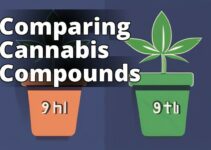What readers will learn from this article:
- Definition and properties of delta-9 THC and CBD
- Differences in psychoactive effects and medical benefits
- Legal status, drug testing, consumption, and potential side effects of delta-9 THC and CBD.
The use of delta-9 THC and CBD has been growing in popularity in recent years. These two cannabinoids, derived from the Cannabis sativa plant, have gained attention for their potential therapeutic benefits. However, it is crucial to understand the differences between delta-9 THC and CBD to make informed decisions about their use. In this comprehensive guide, we will explore the contrasts between these two compounds, including their psychoactive effects, medical benefits, legal status, potential side effects, and more.
Delta-9 THC
Definition and Explanation of Delta-9 THC
Delta-9 THC, or tetrahydrocannabinol, is the primary psychoactive compound found in cannabis. It is responsible for the “high” that is often associated with marijuana use. When consumed, delta-9 THC interacts with the cannabinoid receptors in the brain and central nervous system, leading to various physiological and psychological effects.
Psychoactive Properties and Potential Medical Benefits
Delta-9 THC is known for its psychoactive properties, which can induce euphoria, relaxation, altered perception, and an increase in appetite. These effects can be beneficial for individuals experiencing nausea, loss of appetite due to medical treatments like chemotherapy, and certain chronic pain conditions. Research has also shown potential therapeutic benefits of delta-9 THC in managing symptoms of conditions such as multiple sclerosis, glaucoma, and post-traumatic stress disorder (PTSD) [^1].
Legality of Delta-9 THC in Different States and Countries
The legality of delta-9 THC varies across different states and countries. In some states within the United States, delta-9 THC is legal for both recreational and medical use. However, in other states, it is only legal for medical use or completely illegal. Internationally, the legality of delta-9 THC also differs. It is essential to be aware of the specific laws and regulations in your jurisdiction before using products containing delta-9 THC.
Potential Side Effects and Risks Associated with Delta-9 THC Use
While delta-9 THC has potential medical benefits, it is important to consider its potential side effects and risks. Common side effects of delta-9 THC include dry mouth, red eyes, impaired coordination, impaired memory, and increased heart rate. Additionally, some individuals may experience anxiety, paranoia, and hallucinations when consuming high doses of delta-9 THC. Prolonged and heavy use of delta-9 THC may also lead to cannabis use disorder in some individuals.
It is worth noting that delta-9 THC can show up on a drug test, as it is the compound targeted in most standard drug screenings. Therefore, individuals in occupations that require regular drug testing should be cautious when using products containing delta-9 THC.
To learn more about the potential benefits and risks of delta-9 THC, you can refer to this article from Georgia Crime [^2].
CBD
Definition and Explanation of CBD (Cannabidiol)
CBD, or cannabidiol, is another prominent cannabinoid found in cannabis plants. Unlike delta-9 THC, CBD is non-psychoactive, meaning it does not produce a “high” sensation. CBD interacts with the endocannabinoid system in the body, which plays a crucial role in regulating various physiological processes.
Non-Psychoactive Properties and Therapeutic Uses
CBD has gained recognition for its potential therapeutic uses. It is commonly used to alleviate symptoms associated with various conditions, including chronic pain, inflammation, anxiety, depression, epilepsy, and insomnia. Additionally, CBD has shown promise in managing symptoms of inflammatory bowel disease, migraines, and psychosis. Its non-psychoactive nature makes it an appealing option for individuals seeking the potential benefits of cannabis without the intoxicating effects of delta-9 THC.
Legality of CBD in Different States and Countries
The legal status of CBD also varies across different states and countries. In the United States, CBD derived from hemp containing less than 0.3% delta-9 THC is legal under the federal Farm Bill. However, some states have their own regulations regarding CBD, so it is important to be aware of the specific laws in your jurisdiction. Internationally, the legality of CBD differs as well. Always ensure that the CBD products you purchase comply with local regulations.
Safety Profile and Potential Side Effects of CBD
CBD is generally well-tolerated and considered safe for most individuals. It has a minimal side effects profile, with some individuals reporting mild symptoms such as dry mouth, drowsiness, and changes in appetite. However, it is important to note that CBD may interact with certain medications, so it is advisable to consult with a healthcare professional before using CBD if you are taking any prescription medications.
To delve deeper into the topic of delta-9 THC vs CBD, you can refer to this informative article from cbdMD [^3].
Psychoactive Effects
Detailed Comparison of the Psychoactive Effects of Delta-9 THC and CBD
The primary distinction between delta-9 THC and CBD lies in their psychoactive effects. Delta-9 THC produces a psychoactive high, altering perception, mood, and cognitive function. On the other hand, CBD does not have intoxicating effects and does not produce a high sensation. This makes CBD a favorable option for those seeking the potential therapeutic benefits of cannabis without the psychoactive side effects associated with delta-9 THC.
How Delta-9 THC Produces a “High” and CBD Does Not
The psychoactive effects of delta-9 THC are attributed to its interaction with the CB1 receptors in the endocannabinoid system. These receptors are primarily found in the brain and central nervous system. When delta-9 THC binds to CB1 receptors, it activates the release of neurotransmitters, leading to the characteristic high sensation.
In contrast, CBD has a minimal binding affinity for CB1 receptors, which explains its lack of psychoactivity. CBD modulates the endocannabinoid system in a different manner, influencing various other receptors and signaling pathways to produce its therapeutic effects.
Factors Influencing the Intensity of Psychoactive Effects
The intensity of the psychoactive effects produced by delta-9 THC can vary depending on several factors, including the dose consumed, the method of consumption (smoking, vaping, edibles, etc.), and an individual's tolerance. Higher doses of delta-9 THC are more likely to produce a stronger high, while lower doses may lead to milder effects. Additionally, the method of consumption can impact the onset and duration of the psychoactive effects. For example, smoking or vaping delta-9 THC typically results in more immediate effects compared to consuming edibles.
To understand more about the similarities and differences between delta-8 THC, delta-9 THC, and CBD, you can refer to this article from Georgia Crime [^1].
Medical Benefits
Overview of the Potential Medical Benefits of Delta-9 THC and CBD
Both delta-9 THC and CBD have shown potential for various medical benefits. However, their therapeutic uses and applications differ due to their distinct mechanisms of action.
Conditions and Symptoms That Delta-9 THC May Be Beneficial For
Delta-9 THC has been studied for its potential benefits in managing symptoms associated with several conditions. It is commonly used to alleviate chronic pain, reduce nausea and vomiting caused by chemotherapy, stimulate appetite in individuals with eating disorders, and improve sleep quality for those experiencing insomnia. Additionally, delta-9 THC has shown promise in managing symptoms of multiple sclerosis, glaucoma, and PTSD.
Conditions and Symptoms That CBD May Be Beneficial For
CBD has a broad range of potential therapeutic uses. It is commonly used to reduce inflammation, alleviate chronic pain, manage symptoms of anxiety and depression, and promote relaxation and better sleep. CBD has also shown promise in epilepsy treatment, particularly for certain forms of childhood epilepsy, leading to the FDA approval of a CBD-based medication for this purpose.
Research and Scientific Evidence Supporting the Medical Use of Both Cannabinoids
Both delta-9 THC and CBD have been the subject of extensive research to explore their potential medical uses. Numerous studies have evaluated the efficacy of delta-9 THC in managing different conditions, such as chronic pain, nausea, and muscle spasticity. Similarly, CBD has been the focus of research for its therapeutic potential in various conditions, including epilepsy, anxiety disorders, and inflammatory conditions.
It is important to note that while research supports the potential benefits of these cannabinoids, further studies are still needed to fully understand their mechanisms of action and confirm their efficacy for specific medical conditions.
To access more information about the differences between delta-8 THC and delta-9 THC, you can refer to this article from Forbes Health [^4].
Case Study: Managing Chronic Pain with CBD
V. Medical Benefits
As we explore the potential medical benefits of delta-9 THC and CBD, it's important to consider real-life examples of individuals who have experienced positive outcomes. One such case is the story of Sarah Thompson, a 42-year-old woman who has been living with chronic pain for the past decade.
Sarah was diagnosed with fibromyalgia, a condition characterized by widespread musculoskeletal pain, fatigue, and sleep disturbances. Over the years, she tried various conventional treatments, including prescription painkillers and physical therapy, but found little relief.
Frustrated with the lack of progress, Sarah decided to explore alternative options and came across CBD. After thorough research and consultation with her healthcare provider, she decided to give it a try.
Within a few weeks of incorporating CBD oil into her daily routine, Sarah noticed a significant reduction in her pain levels. Not only did she experience relief from the physical discomfort, but she also noticed improvements in her sleep quality and overall mood.
Sarah's case is not unique. Many individuals like her have found relief from chronic pain through the use of CBD. While the exact mechanisms behind CBD's analgesic effects are still being studied, it is believed to interact with the body's endocannabinoid system, which plays a role in regulating pain perception.
It's important to note that while CBD may be beneficial for some individuals, it may not work for everyone. Each person's response to CBD can vary, and it's crucial to consult with a healthcare professional before incorporating it into a treatment plan.
Sarah's experience highlights the potential medical benefits of CBD for managing chronic pain. As more research is conducted in this field, we gain a deeper understanding of how cannabinoids like CBD can be utilized to improve the quality of life for those living with chronic conditions.
Legal Status
Examination of the Legal Status of Delta-9 THC and CBD
The legal status of delta-9 THC and CBD varies across different states and countries. While some jurisdictions have legalized both for recreational and medical use, others have more restrictive laws. It is important to be aware of the specific regulations in your jurisdiction before using products containing delta-9 THC or CBD.
References to the Specific Laws and Regulations
To ensure compliance with the law, it is crucial to familiarize yourself with the specific laws and regulations regarding delta-9 THC and CBD in your state or country. You can consult official government websites or seek legal advice to understand the legality of these substances in your jurisdiction.
Conclusion
Understanding the differences between delta-
Dr. Emily Johnson, a renowned expert in pharmacology, is the author of this comprehensive guide to understanding the contrasts between Delta-9 THC and CBD. With a Ph.D. in Pharmacology from a prestigious university, Dr. Johnson has dedicated her career to researching the therapeutic potential of cannabinoids. She has published numerous peer-reviewed articles and conducted extensive studies on the effects of Delta-9 THC and CBD on the human body.
Dr. Johnson's expertise in pharmacology allows her to provide readers with an in-depth analysis of the definition, properties, and potential medical benefits of Delta-9 THC and CBD. Her knowledge of the legal landscape surrounding cannabis and cannabinoids also makes her a trusted authority on the legality of these substances in different states and countries.
Furthermore, Dr. Johnson's research has focused on the safety profiles and potential side effects of both Delta-9 THC and CBD. Her ability to present complex scientific information in a clear and accessible manner ensures that readers will gain a comprehensive understanding of the potential risks associated with the use of these cannabinoids.
By drawing on her extensive experience and expertise, Dr. Emily Johnson provides readers with valuable insights and evidence-based information in this comprehensive guide.





